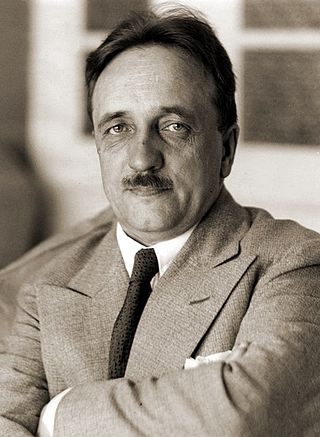
A gold standard is a monetary system in which the standard economic unit of account is based on a fixed quantity of gold. The gold standard was the basis for the international monetary system from the 1870s to the early 1920s, and from the late 1920s to 1932 as well as from 1944 until 1971 when the United States unilaterally terminated convertibility of the US dollar to gold, effectively ending the Bretton Woods system. Many states nonetheless hold substantial gold reserves.

Monetarism is a school of thought in monetary economics that emphasizes the role of policy-makers in controlling the amount of money in circulation. It gained prominence in the 1970s, but was mostly abandoned as a direct guidance to monetary policy during the following decade because of the rise of inflation targeting through movements of the official interest rate.
In economics, deflation is a decrease in the general price level of goods and services. Deflation occurs when the inflation rate falls below 0%. Inflation reduces the value of currency over time, but deflation increases it. This allows more goods and services to be bought than before with the same amount of currency. Deflation is distinct from disinflation, a slowdown in the inflation rate; i.e., when inflation declines to a lower rate but is still positive.
Monetary economics is the branch of economics that studies the different theories of money: it provides a framework for analyzing money and considers its functions, and it considers how money can gain acceptance purely because of its convenience as a public good. The discipline has historically prefigured, and remains integrally linked to, macroeconomics. This branch also examines the effects of monetary systems, including regulation of money and associated financial institutions and international aspects.

The Bretton Woods system of monetary management established the rules for commercial relations among the United States, Canada, Western European countries, and Australia as well as 44 other countries after the 1944 Bretton Woods Agreement. The Bretton Woods system was the first example of a fully negotiated monetary order intended to govern monetary relations among independent states. The Bretton Woods system required countries to guarantee convertibility of their currencies into U.S. dollars to within 1% of fixed parity rates, with the dollar convertible to gold bullion for foreign governments and central banks at US$35 per troy ounce of fine gold. It also envisioned greater cooperation among countries in order to prevent future competitive devaluations, and thus established the International Monetary Fund (IMF) to monitor exchange rates and lend reserve currencies to nations with balance of payments deficits.

The causes of the Great Depression in the early 20th century in the United States have been extensively discussed by economists and remain a matter of active debate. They are part of the larger debate about economic crises and recessions. The specific economic events that took place during the Great Depression are well established.

The impossible trinity is a concept in international economics and international political economy which states that it is impossible to have all three of the following at the same time:
The European Payments Union (EPU) was an organization in existence from July 1950 to December 1958, when it was replaced by the European Monetary Agreement.
John E. Floyd is a Canadian economist and member of the University of Toronto faculty.

José De Gregorio Rebeco is a Chilean economist, academic, researcher, consultant and politician. He has been the Governor of the Central Bank of Chile, Minister of the Economy, Mining and Energy during the administration of Ricardo Lagos and is currently the Dean of the School of Economics and Business of the Universidad de Chile. He is also a nonresident Senior Fellow at the Peterson Institute for International Economics.

A Monetary History of the United States, 1867–1960 is a book written in 1963 by Nobel Prize–winning economist Milton Friedman and Anna J. Schwartz. It uses historical time series and economic analysis to argue the then-novel proposition that changes in the money supply profoundly influenced the U.S. economy, especially the behavior of economic fluctuations. The implication they draw is that changes in the money supply had unintended adverse effects, and that sound monetary policy is necessary for economic stability. Orthodox economic historians see it as one of the most influential economics books of the century. The chapter dealing with the causes of the Great Depression was published as a stand-alone book titled The Great Contraction, 1929–1933.

The Great Depression (1929–1939) was a severe global economic downturn that affected many countries across the world. It became evident after a sharp decline in stock prices in the United States, leading to a period of economic depression. The economic contagion began around September 1929 and led to the Wall Street stock market crash of 24 October. This crisis marked the start of a prolonged period of economic hardship characterized by high unemployment rates and widespread business failures.

Takatoshi Ito is a Japanese economist. He is a professor of the School of International and Public Affairs, Columbia University and a senior professor of the National Graduate Institute for Policy Studies.
The term exorbitant privilege refers to the benefits the United States has due to its own currency being the international reserve currency. For example, the US would not face a balance of payments crisis, because their imports are purchased in their own currency. Exorbitant privilege as a concept cannot refer to currencies that have a regional reserve currency role, only to global reserve currencies.
The gold bloc were seven countries led by France that stuck to the gold standard monetary policy during the Great Depression, even though many other countries abandoned it. In addition to France, the gold bloc included Belgium, Luxembourg, the Netherlands, Italy, Poland, and Switzerland.
Charles Wyplosz is a French economist. He is an editor of the International Centre for Economic Policy Research's VoxEU and is currently the director of the International Centre for Monetary and Banking Studies (ICMB) and Professor of International Economics at the Graduate Institute in Geneva, Switzerland. He was a founding managing editor of Economic Policy.
Brigitte Evelyne Granville is an economist with dual French and British nationality. She is Professor of International Economics and Economic Policy in the School of Business and Management at Queen Mary University of London. She founded the Centre for Globalisation Research (CGR).

Feliks Młynarski was a Polish banker, philosopher and economist.
Kevin Hjortshøj O'Rourke, is an Irish economist and historian, who specialises in economic history and international economics. Since 2019, he has been Professor of Economics at New York University Abu Dhabi. He was Professor of Economics at Trinity College, Dublin from 2000 to 2011, and had previously taught at Columbia University and University College, Dublin. From 2011 to 2019, he was Chichele Professor of Economic History at the University of Oxford and a Fellow of All Souls College, Oxford.
Michael David Bordo is a Canadian and American economist, currently Board of Governors Professor of Economics and Distinguished Professor of Economics at Rutgers University. He is a research associate at the National Bureau of Economic Research as well as a Distinguished Visiting Fellow at the Hoover Institution at Stanford University. He is the third most influential economic historian worldwide according to the RePEc/IDEAS rankings. He was a student of Milton Friedman and has co-authored numerous books and articles with Anna Schwartz.










